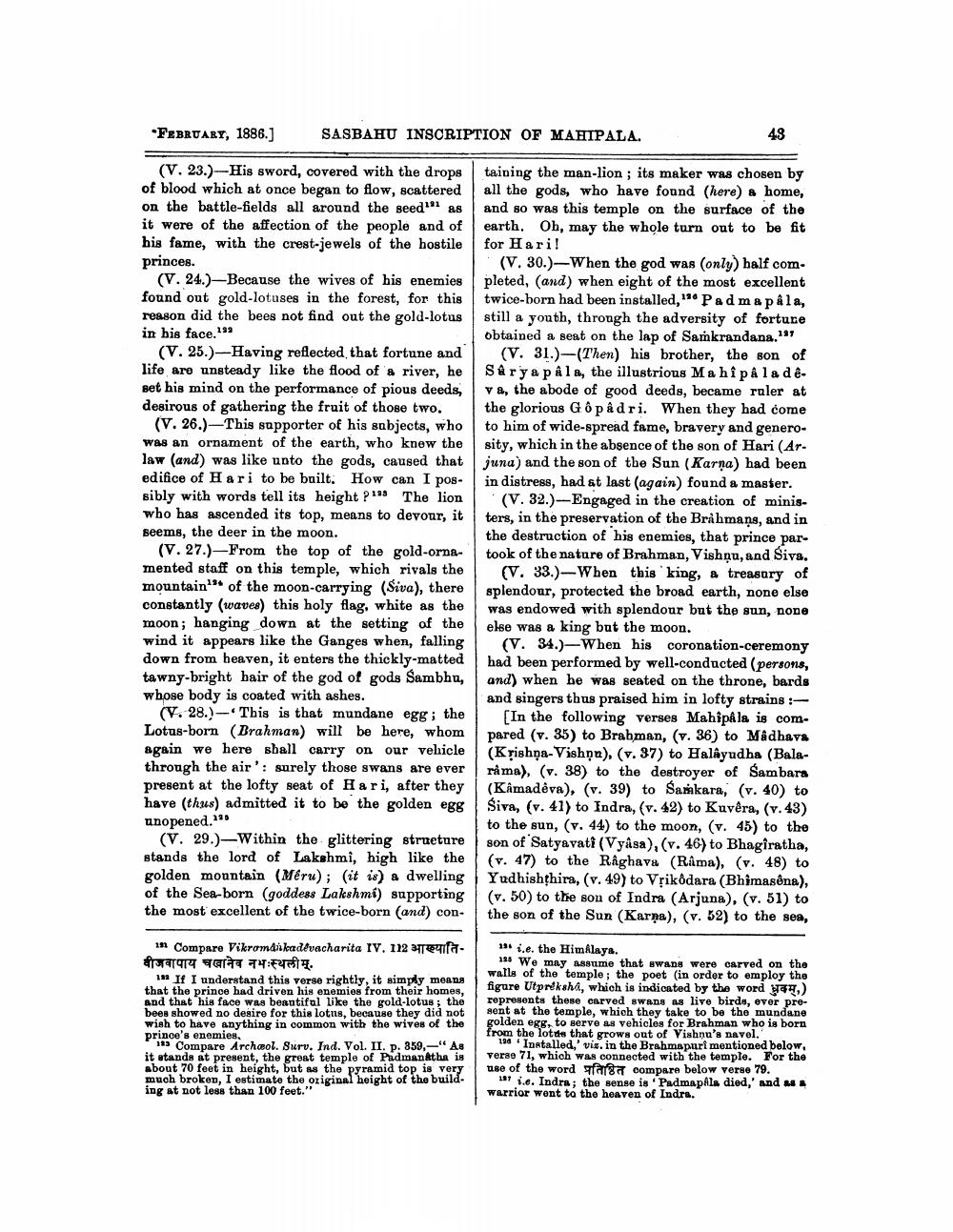________________
FEBRUARY, 1886.]
SASBAHU INSCRIPTION OF MAHIPALA.
(V. 23.)-His sword, covered with the drops of blood which at once began to flow, scattered on the battle-fields all around the seed11 as it were of the affection of the people and of his fame, with the crest-jewels of the hostile princes.
(V. 24.)-Because the wives of his enemies found out gold-lotuses in the forest, for this reason did the bees not find out the gold-lotus in his face.122
desirous of gathering the fruit of those two.
(V. 26.) This supporter of his subjects, who was an ornament of the earth, who knew the law (and) was like unto the gods, caused that edifice of Hari to be built. How can I possibly with words tell its height ?13 The lion who has ascended its top, means to devour, it seems, the deer in the moon.
(V. 30.)-When the god was (only) half completed, (and) when eight of the most excellent twice-born had been installed, 12 Padmapâla, still a youth, through the adversity of fortune obtained a seat on the lap of Samkrandana.11" (V. 31.)-(Then) his brother, the son of Sarya pala, the illustrious Mahipala dê
(V. 25.)-Having reflected, that fortune and life are unsteady like the flood of a river, he set his mind on the performance of pious deeds,va, the abode of good deeds, became ruler at
the glorious Gô pådri. When they had come to him of wide-spread fame, bravery and generosity, which in the absence of the son of Hari (Arjuna) and the son of the Sun (Karna) had been in distress, had at last (again) found a master.
(V. 32.)-Engaged in the creation of ministers, in the preservation of the Brahmans, and in the destruction of his enemies, that prince partook of the nature of Brahman, Vishnu, and Siva.
(V. 27.)-From the top of the gold-ornamented staff on this temple, which rivals the mountain1 of the moon-carrying (Siva), there constantly (waves) this holy flag, white as the moon; hanging down at the setting of the wind it appears like the Ganges when, falling down from heaven, it enters the thickly-matted tawny-bright hair of the god of gods Sambhu, whose body is coated with ashes.
(V. 28.) This is that mundane egg; the Lotus-born (Brahman) will be here, whom again we here shall carry on our vehicle through the air': surely those swans are ever present at the lofty seat of Hari, after they have (thus) admitted it to be the golden egg unopened."
(V. 29.) Within the glittering structure stands the lord of Lakshmi, high like the golden mountain (Méru); (it is) a dwelling of the Sea-born (goddess Lakshmi) supporting the most excellent of the twice-born (and) con
in Compare Vikromankadevacharita IV. 112 faवीजवापाय चखानेव नभःस्थलीम्.
48
1 If I understand this verse rightly, it simply means that the prince had driven his enemies from their homes, and that his face was beautiful like the gold-lotus; the bees showed no desire for this lotus, because they did not wish to have anything in common with the wives of the prince's enemies.
133 Compare Archeol. Surv. Ind. Vol. II. p. 359,-"As it stands at present, the great temple of Padmanatha is about 70 feet in height, but as the pyramid top is very much broken, I estimate the original height of the building at not less than 100 feet."
taining the man-lion; its maker was chosen by all the gods, who have found (here) a home, and so was this temple on the surface of the earth. Oh, may the whole turn out to be fit for Hari!
(V. 33.)-When this king, a treasury of splendour, protected the broad earth, none else was endowed with splendour but the sun, none else was a king but the moon.
(V. 34.)-When his coronation-ceremony had been performed by well-conducted (persons, and) when he was seated on the throne, bards and singers thus praised him in lofty strains :
[In the following verses Mahipala is compared (v. 35) to Brahman, (v. 36) to Madhava (Krishna-Vishnu), (v. 37) to Halayudha (Balarama), (v. 38) to the destroyer of Sambara (Kâmadêva), (v. 39) to Samkara, (v. 40) to Šiva, (v. 41) to Indra, (v. 42) to Kuvêra, (v. 43) to the sun, (v. 44) to the moon, (v. 45) to the son of Satyavati (Vyasa), (v. 46) to Bhagiratha, (v. 47) to the Raghava (Râma), (v. 48) to Yudhishthira, (v. 49) to Vrikôdara (Bhimasêna), (v. 50) to the son of Indra (Arjuna), (v. 51) to the son of the Sun (Karna), (v. 52) to the sea,
1 i.e. the Himalaya.
135 We may assume that swans were carved on the walls of the temple; the poet (in order to employ the figure Utpreksha, which is indicated by the word,) represents these carved swans as live birds, ever present at the temple, which they take to be the mundane golden egg, to serve as vehicles for Brahman who is born from the lotus that grows out of Vishnu's navel."
138 Installed,' vis. in the Brahmapurî mentioned below, verse 71, which was connected with the temple. For the use of the word fa compare below verse 79.
17.e. Indra; the sense is Padmapala died,' and as a warrior went to the heaven of Indra.




